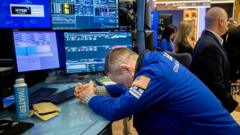The US stock markets experienced volatile trading, with the S&P 500 navigating significant fluctuations, prompting investor concerns over potential economic implications due to tariff escalations.
Wild Market Turbulence as Tariff Fears Shake the US Economy

Wild Market Turbulence as Tariff Fears Shake the US Economy
Investors are wary as President Trump escalates tariff threats while seeking trade deals.
Shares on Wall Street encountered significant turbulence on Monday, as traders grappled with a mix of uncertainty stemming from US President Donald Trump's heightened tariff threats against China. The S&P 500 index managed to close slightly down by approximately 0.2%, following a day of extraordinary trading marked by erratic fluctuations reminiscent of the dramatic swings seen during the pandemic's onset. Despite the discouraging tariff escalations, hopes arose among investors that the President would pivot towards pursuing trade deals.
Following a concerning announcement last Wednesday, Trump has indicated a dual approach to tariffs, suggesting that some will be maintained indefinitely while others may be subject to negotiation. "Both can be true," he stated, as the administration signaled openness to discussions with over 50 countries regarding trade agreements. European trade representatives are preparing to find a balanced approach to responding.
Since Trump's recent tariff moves, stock markets in both the US and UK have experienced their sharpest declines since the early stages of the COVID-19 crisis, with the S&P 500 suffering a 10% depreciation in just three days, reminiscent of the steep falls observed during the 2008 financial crisis. Currently, the index's performance reflects market unease, with its values reverting to levels approximating a year prior.
Mike Mussio, president of FBB Capital, remarked on the frustrations affecting investors, deeming the situation to resemble an "unforced error" in policy. Prominent business figures, including Jamie Dimon and Trump supporters Bill Ackman and Daniel Loeb, have voiced concerns about the ongoing market turmoil.
Trump has intensified his aggressive tariff stance, threatening to levy an additional 50% tariff on Chinese imports if retaliatory measures are not lifted, which would culminate in taxes exceeding 100% on Chinese goods entering the US. The steep tariffs imposed by both the US and China continue to stoke fears of a broader trade war with potential negative repercussions on global economies.
Analysts caution that an impasse with Trump could lead to detrimental impacts on corporate profits and significant economic slowdowns. Early trading showed marked declines, with the S&P 500 briefly nearing a 20% reduction from its highest point this year, a threshold often categorized as a bear market. However, rumors suggesting a possible halt to tariffs led to a brief resurgence for shares.
Howard Silverblatt, a senior analyst at S&P Dow Jones Indices, noted the unprecedented volatility observed in his extensive experience in the financial markets. The day concluded with the Dow Jones Industrial Average down by 0.9%, while Nasdaq recorded a minor gain of 0.1%. European markets followed a downward trend, with the London FTSE 100 closing 4.4% lower, reaching its lowest mark in over a year. The stark sentiment fed into commodity pricing, contributing to noticeable dips in oil and copper prices, viewed as precursors to economic activity, while gold prices, seen as a safe haven for investments, also fell amidst the turmoil.






















